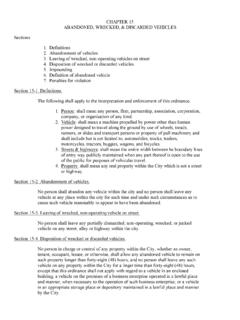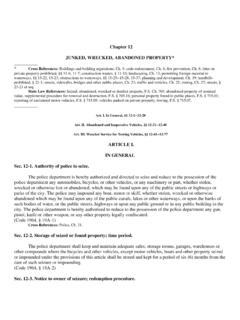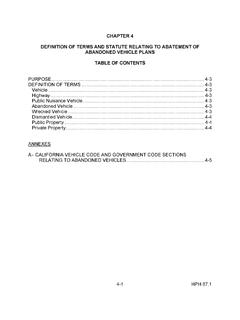Transcription of Wrecked, Not Lost - eternallifeministries.org
1 wrecked , NOT LOST Or The Pilot and His Companions Written in 1872 By Hon. Mrs. Dundas Chapter 1 Archangel Those who look at the map of Europe will perceive that the province of Archangel forms a large part of European Russia and that its shores are washed by the White Sea and the Arctic, or Frozen Ocean, whose waters remain frozen from September to June, thus forming an icy boundary to a country, the climate of which is consequently, for the greater part of the year, cold and rigorous in the extreme. The season of spring is unknown in those dreary regions and the long and dark winter is succeeded only by a short and cheerless summer. It may, therefore, be imagined that vegetable productions are but scanty and that were it not for the animals which Providence has bestowed as it were in compensation, the inhabitants of such countries would lack every means of subsistence.
2 Their short summer is passed in fishing and providing for the wants of the winter by the sale of the furs of the animals killed in hunting, which traffic forms the great resource of the inhabitants of the frozen and Polar Regions. The animals in such climates are generally covered with the rich fur, which not only protects them from the extreme cold, but adds greatly to their value. The reindeer is the chief treasure of the natives of those countries and the source of most of their scanty comforts. So numerous and important are the uses of these animals that there are few in those regions who do not possess them, they are in fact substitutes for the horse, the cow, and the sheep. Harnessed to a sledge, the reindeer bounds over frozen lakes and rivers and pursues his course, by night as well as by day o er trackless paths of snow. Of their milk, cheese is made.
3 Their flesh supplies food, whilst their skin furnishes clothes and bedding and even covering for tents. Considering the unfavorable position of this part of Russia, it is not surprising that it is but thinly peopled and this would be still more the case were it not that many Laplanders and Samoyeds from time to time settle there. The town of Archangel is the capital of the province and was at one time the only seaport of Russia, and remained so till the formation of the docks at Kronstadt and the foundation of St. Petersburg in 1703. The passage to it was discovered by the English in 1553. It is situated on a low and marshy spot on the Dvina, which river empties itself into the White Sea. The town is built entirely of wood and contains about 15,000 inhabitants. Its harbor is the great depot of the trade with Siberia and is also frequented by a vast number of Dutch, English, and German vessels, drawn there to trade in furs, metals, and timber for ship building, chiefly larch, as this wood by constant immersion in water becomes almost as hard as stone.
4 Buildings constructed of larch timber are said to have remained sound 200 years. Of such are some of the beams of the old palaces in Venice, still as sound as when first laid for the foundation of that city of the sea. The harbor of Archangel is also the resort of ships engaged in the whale fishery on the coasts of Spitzbergen and Nova Zembla. There is also a considerable dockyard for the construction and fitting out of vessels of war as well as trade. And thus in spite of the severity of the climate and the sterility of the soil, the people of Archangel find not only the means of subsistence, but even of wealth and obtain from those who visit their shores, not only money, but the produce of more favored countries in exchange for the few but valuable productions of their dreary land. Chapter 2 Ozaroff and His Son Alexis About forty years ago, amongst the wealthy merchants of this Russian seaport, the name of George Ozaroff stood highest.
5 His prudence and integrity had not only secured him a considerable fortune, but the respect and esteem of all with whom he had to do. Ozaroff had one son, the object of all his cares and hopes. Tall, strong, and well-built, the young Alexis had been early hardened to the difficulties of his native climate, and gave promise not only of health and strength, but of a disposition calculated to form a character such as his father desired in his son. Considerable care had been bestowed on his education and though destined to succeed to his father s business, he had been instructed in other branches of learning besides those connected with it, as Ozaroff rightly judged that no learning or information comes amiss to those who occupy positions of wealth or trust, and that a cultivated mind exalts even more than riches. In addition to this, Alexis had been early taught to fear God, to love his neighbor, and to respect the laws of his country.
6 Hitherto, Alexis had pursued his studies alone and had been the sole object of the tender care and consideration of his parents, but about this period, Ozaroff lost a brother, who died leaving an only child, a son nearly Alexis age, and who having some time before been deprived of his mother, was now an orphan. The good merchant hesitated not to receive the fatherless boy into his house, but at once determined to supply to him the place of the father he had lost and to let him share the advantages he was able to bestow on his own son. Ivan, therefore, became an inmate of his uncle s house and shared in all his cousin s studies and pursuits. The boy s disposition was good and affectionate and in natural abilities, he was superior to Alexis, added to which, he applied with diligence to his tasks. When not engaged in study, he was thoughtless and easily influenced by the attraction of the moment.
7 Few things made any lasting impression on him and though unhappy if he gave pain to those he loved, he was continually doing so from want of thought and from his habit of yielding to present temptation, regardless of consequences. As is common with such characters, his temper was kind and amiable, and the charm of his good humor and gaiety unfortunately procured for him a degree of indulgence that served only to encourage his natural instability of character and recklessness of all but the gratification of the moment. Alexis yielded but too easily to his new companion, who generally sought his own gratification, rather than the wishes of those to whom he owed obedience and submission. The following tale will show into what unforeseen dangers and troubles such conduct may lead those who pursue it. Chapter 3 Predilection for the Sea Ozaroff, as we have seen, destined his son for the career which he had himself pursued with credit and success, and had conducted his education with the view to qualify him for it.
8 Ivan shared in the instructions given to his cousin, but it was soon evident that when at liberty to follow his inclinations, his taste led him to the harbor rather than to his uncle s warehouses. He took delight in conversing with the sailors on board the different vessels lying in the harbor, became familiar with their various purposes and destinations, and acquired some knowledge of the duties of sailors, pilot, and captain. With his usual inconsideration, he sought to engage Alexis in the same pursuit and to make him share his taste for a sea life, though he well knew it would defeat his uncle s intentions were he to succeed. By degrees, Alexis yielded to his cousin s persuasions and example, and ere long lost all interest in anything connected with his father s business. Ozaroff soon perceived the change, though for a time he remained ignorant of the cause, but Alexis had no secrets with his father, and in answer to his inquiries readily confessed his wish to acquire such information as might fit him for a sea life and the desire he felt for visiting other countries.
9 Ozaroff was too prudent to betray the vexation he felt at this avowal or to offer any decided opposition. He contented himself with representing to his son the hardships and dangers of a sailor s life, and contrasted it with the comforts and advantages of the one he himself occupied. Unfortunately, Alexis had lost his mother a short time after Ivan had become an inmate of his father s house, or possibly her persuasions, joined to Ozaroff s representations, might have counteracted his cousin s influence. As it was, Alexis persisted in his desire to enter the navy with his cousin and his father determined in consequence on placing the willful youths in the Naval College at St. Petersburg. He knew that in that establishment they would not only be instructed in nautical science, but in every other branch of a sound and practical education, so that if eventually his son relinquished his present project and complied with his wishes, he would still have gained by a residence at one of the best colleges in the capital of the great Russian empire.
10 The good merchant was besides the more inclined to adopt this course, from the idea that his son s character might be benefited by mixing with others of his own age and by being subjected to the control and discipline of a public college instead of following uncontrolled his own pleasures and pursuits at home. Chapter 4 St. Petersburg Ozaroff s decision was received with unmixed satisfaction by Alexis and his cousin, and they prepared with delight for their journey to St. Petersburg. They were accompanied by Ozaroff, who spent some days in showing them the wonders of the Russian capital ere he placed them in their future residence. The imperial city of Petersburg rose from small beginnings. In the year 1703, Peter the Great began it. He built a small hut for himself and a few wretched hovels upon a low marshy spot of ground near the river Neva.









